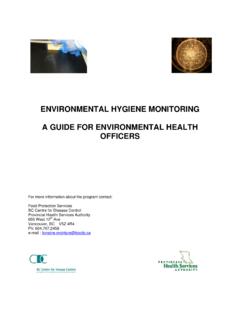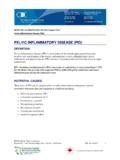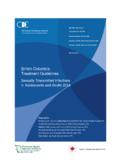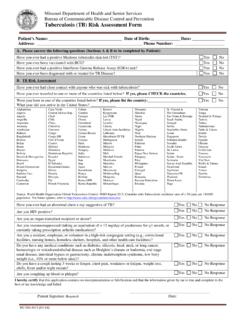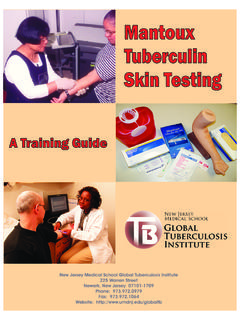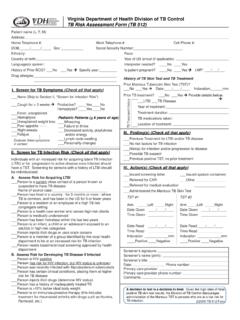Transcription of Interferon Gamma Release Assay Testing for Latent ...
1 Interferon Gamma Release Assay Testing for Latent Tuberculosis Infection: Physician Guidelines Historically, Latent Tuberculosis Infection (LTBI) diagnosis was based on risk assessment , chest x-ray (CXR) and Tuberculin Skin Test (TST) results. The TST is a well-studied and inexpensive test but has limitations. A TST may be false-positive if there is history of BCG vaccination or nontuberculous mycobacterial infection, or false negative if the client is immunocompromised. Interferon Gamma Release Assays (IGRAs) are immunological tests that are not influenced by prior BCG vaccine or most nontuberculous mycobacteria. IGRAs and TSTs are both imperfect tests which must be interpreted within the context of the risk for TB exposure AND risk for progression from LTBI to active TB disease (Table 1). There are many advantages and disadvantages of LTBI Testing with TST and/or IGRA (Table 1).
2 IGRA Testing does not replace the TST but rather, is most often used as an adjunct test in specific populations that require additional information to better determine LTBI status (see Tables 2 and 3). The two IGRA tests available in British Columbia (BC) are: QuantiFERON-Gold [QFT-Gold] (Enzyme-linked Immunosorbent Assay (ELISA) on whole blood). T-SPOT (Enzyme-linked Immunospot Assay on peripheral blood mononuclear cells). Both require specific collection methods and care of samples after collection, which if not followed, can result in erroneous test results. Sample processing is only available at the BC. Public Health Microbiology and Reference Laboratory. In the near future, QuantiFERON-Plus [QFT-Plus] will be available in BC. This document aims to provide clear guidance on who should or should not receive IGRA and the process of arranging IGRA Testing in BC. These guidelines will be reviewed every two years.
3 Table of Contents: TST versus IGRA. Who can order IGRA. IGRA and pre-biologic screening When IGRA Testing is not recommended When IGRA may be indicated Procedures for IGRA screening in BC. November 7, 2018. TST versus IGRA. There is no gold standard test to diagnose Latent TB Infection. The sensitivity and specificity of Testing varies depending upon the population being tested. Table 1: Comparison of TST, QFT-Gold and T-SPOT123. TST IGRA. Population QFT-Gold T-SPOT. Sensitivity: General 75-89% 75-83% ~90%. Specificity: General 85-95% >95% 88-95%. Sensitivity: Low prevalence, 97% >95% 88%. non-BCG. vaccinated Specificity: BCG vaccinated 60% 96% 93%. Comparison of TST to IGRA. TST IGRA (QFT-Gold & T-SPOT). Two visits Single visit Low specificity in immunocompromised* Higher specificity in immunocompromised*. Between reader variability in test Low between reader variability in test interpretation interpretation Inexpensive Costly Similar sensitivity & specificity to IGRA in Similar sensitivity & specificity to TST in healthy, non-BCG vaccinated populations healthy, non-BCG vaccinated populations Serial Testing for employment, school & Serial IGRA tests may vary within one routine screening recommended individual so not recommended Does not confirm active TB disease Does not confirm active TB disease Estimated 5-10% risk of developing active TB Clinical significance in predicting active TB.
4 Disease over lifetime disease has not been ascertained Universally accessible where health workers Blood drawing techniques and time are trained and with access to tuberculin restrictions for laboratory analysis limit locations for IGRA Testing * For example, HIV, AIDs, transplant or cancer patient on immunosuppressive treatment, chronic renal failure requiring hemodialysis November 7, 2018. Who can order IGRA: In BC, publically funded IGRA Testing can only be ordered by BCCDC TB Services (TBS). physicians, clinic nurses, select physician specialists, and Federal Corrections, and can only be performed at designated Testing sites. Please refer directly to the BCCDC website for the most up to date list of BC IGRA Screening Sites. IGRA and pre-biologic screening: Clients taking biological therapy ( , TNF-alpha inhibitors) are at higher risk for reactivation of LTBI. Candidates for biological therapy should be screened for TB prior to first initiating biological therapy.
5 Initial screening should include TB risk assessment , CXR and TST. Not every client going on biological therapy requires IGRA. TST based screening may be sufficient (see below). If treatment of Latent TB is recommended, attempts should be made to complete it prior to starting biological therapy. However, if the risk of delaying biologic therapy is high, clients should receive at least 1-2 months of LTBI treatment prior to starting biologic therapy. Table 2: Pre-biologic clients that do NOT require an IGRA: Context Explanation Changing to a new biologic product, In the absence of new TB exposure since initial different dose, or additional agents screening, IGRA is not needed. Prior history of TB disease and/or IGRA should be positive. treatment Prior history of LTBI treatment Canadian-born or foreign-born from non-TB endemic country No risk factors for exposure If there is no or low epidemiological risk for TB, an TST negative IGRA is not needed.
6 There is a higher risk of false No prior evidence of TB on chest x-ray positive IGRA in populations with low rates of TB. TST positive (regardless of risk factors Consider offering LTBI treatment as risk of for exposure and chest x-ray results) reactivation is high.*. November 7, 2018. Foreign-born from TB endemic country TST positive (regardless of BCG Consider offering LTBI treatment. vaccination status). * Physician discretion should be used in determining if there is added benefit in performing an IGRA in these situations ( , clients who have received a BCG vaccination from a low TB incidence country or instances in which there is concern about the validity of the positive TST). When IGRA Testing is not recommended: Avoid IGRA in clients: 1) with suspected or confirmed history of active TB disease and/or treatment;. 2) with history of previous positive IGRA or history of LTBI therapy.
7 3) requiring serial Testing for employment;. 4) requiring routine contact follow-up 5) where clinical management will not be influenced by the result ( , HIV with +ve TST). Epidemiologic evidence exists for sequential Testing based on result ( , test first with TST, then offer IGRA based on TST result) but not for parallel Testing . When IGRA may be indicated Table 3: Indications for IGRA Testing Indications for IGRA Explanation Example Test BCG Vaccinated TST positive To avoid unnecessary LTBI Aboriginal QFT-Gold AND therapy or serial CXR in Foreign-born BCG vaccinated those who had a BCG and Student or Health Care AND are at low risk of Worker with BCG. Low risk of TB exposure^ developing active TB Returned traveller with or reactivation to exclude LTBI diagnosis BCG. TST positive To provide additional Contact in BCG QFT-Gold AND information to those who vaccinated individual BCG vaccinated likely have LTBI (based on who does not believe AND history and TST) and are TST result November 7, 2018.
8 High risk of TB considering LTBI. exposure or treatment and willing to reactivation accept LTBI therapy if IGRA is positive . Indications for IGRA Explanation Example Test Independent of BCG Vaccination TST negative To provide additional Individuals with HIV and QFT-Gold AND information to help significant or T-SPOT . Immunocompromised* diagnose LTBI in specific immunosuppression. AND individuals in whom TST is High risk of TB negative but there is exposure strong clinical suspicion of LTBI with increased risk for morbidity/mortality Unlikely to return for In those who are unlikely Homeless QFT-Gold TST read to return to TST read or New migrants from high AND the follow-up TST test in TB burden countries High risk of TB high risk populations . exposure or reactivation Specific medical High likelihood of New dialysis clients QFT-Gold . condition progression to active TB Before solid organ or disease and poor bone-marrow predictive value of TST in transplants these populations Previous indeterminate To confirm an QFT-Gold IGRA indeterminate IGRA test if or T-SPOT.
9 A change in clinical management will result. IGRA is repeated once only. At discretion of TB Complex medical QFT-Gold November 7, 2018. Physician circumstances that do not or T-SPOT . fit into general guidelines . A negative IGRA does not rule out active TB disease. If active disease is suspected, a chest X-Ray and sputa are indicated ^. , From low incidence country or never in contact with active pulmonary TB.. , Type 1 or 2 contact of active pulmonary TB case or from high TB incidence country . Patients who are TST positive, at high risk of TB exposure and not BCG vaccinated should be treated for LTBI. irrespective of IGRA result. In these patients IGRA should not be offered. *. HIV, AIDs, transplant or cancer patient on immunosuppressive treatment, silicosis, chronic renal failure requiring dialysis, or patient taking prednisone 15mg/day or more for more than 4 weeks . Although T-Spot is a more sensitive test in immunosuppressed individuals, if unavailable, use QFT.
10 If noncompliance is a concern for reading the TST, noncompliance would be a concern for LTBI therapy so, IGRA. may not be warranted.. Despite some evidence that may suggest that T-Spot is marginally more sensitive than QFT in these populations, QFT is recommended because of availability of the test in BC. At times, T-Spot, if available may be requested.. At times, serial Testing may be indicated but ordering both tests simultaneously is usually unnecessary Procedures for IGRA Testing in BC: Referrals to BCCDC TB Services for IGRA may be made via: Fax or Mail: Provider consult letter TB Screening Form (HLTH 939) or BCCDC Provincial TB Services 655 West 12th Avenue Vancouver, BC V5Z 4R4. Fax: Email referral from public health Referrals should include a recent CXR (unless contraindicated): Within 3 months if immunocompromised Within 6 months if immunocompetent New CXR if symptomatic or new positive TST.

